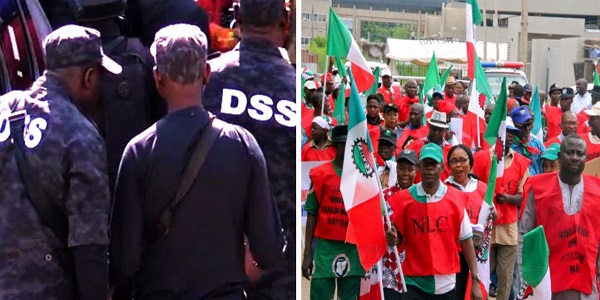A rift has emerged between the Department of State Services (DSS) and the Nigeria Labour Congress (NLC) over the planned protest scheduled to address the hardship stemming from the removal of petrol subsidy.
The disagreement escalated as the Trade Union Congress (TUC) distanced itself from the planned protest, labelling it a unilateral action by the NLC.
The NLC had announced a 2-day protest, following the expiration of a 2-week ultimatum for the government to fully implement a 16-point agreement reached last October.
The DSS voiced its opposition to the protest, expressing the concern that it could be hijacked by hoodlums to incite chaos.
Dr. Peter Afunanya, DSS director of Public Relations and Strategic Communications, urged the labour movement to prioritize dialogue over disruptive actions, stating, “The development, without doubt, will worsen the socio-economic situation across the country.”
In response, the NLC rebuked the DSS stance, asserting its commitment to a peaceful protest.
NLC President, Joe Ajaero, criticized DSS characterization of the protest as potentially violent, stating, “We are concerned by the unsolicited advice of the DSS to shelve our planned protest against the unprecedented high cost of living.”
Ajaero emphasized the history of peaceful demonstrations by the labour movement.
Ajaero also challenged the DSS’s portrayal of itself as government’s spokesperson, emphasizing the legitimate grievances fuelling the planned protest.
“More worrying is the new role the service has assigned to itself, the chief spokesperson of the government”, he said.
Highlighting the dire economic conditions facing Nigerians, Ajaero stressed the necessity of voicing dissent against rising living costs.
He rejected any insinuation of violence, reaffirming the peaceful nature of the planned protest and accusing the DSS of attempting to manipulate public perception.
As tension mounts between the security agency and labour unions, the stage is set for a showdown between government and organized labour, with the specter of public unrest looming large amidst deepening economic woes.
